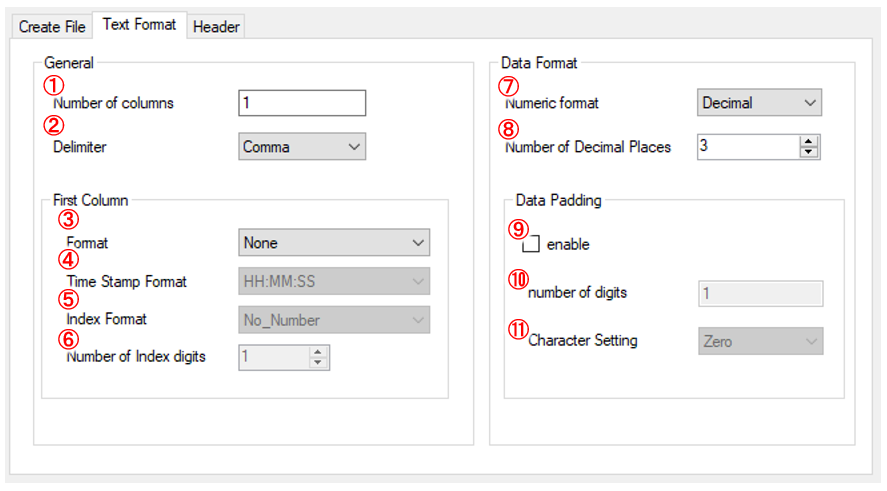
Describe the Text Format tab on the DncWriteFile Setting panel.
It is possible to set such as the number of columns to write to the file, specify the data in the first column, and set the data format.

①Number of columns
Specifies the number of data columns when the file is created.
If more than this number of columns is written, WriteLineData will not write more than the number of columns.
The number of columns is valid in the range of 1-100.
②Delimiter
Specifies the delimiter that separates the columns.
Item |
Description |
Comma |
Use the comma. |
Tab |
Use the tab. |
③First Column Format
It is used when adding the first column.
Item |
Description |
None |
Do not add the first column. |
TimeStamp |
Add the time to the first column. The time format is specified in the Time Stamp Format. |
Index |
Add the index to the first column. The index format is specified by the Index Format. |
④Time Stamp Format
Select the time format when specifying the TimeStamp.
Item |
Description |
HH:MM:SS |
Writes the time stamp in the format of hours:minutes:seconds when the data was written. |
HH:MM:SS.FFF |
Writes the time stamp in the format of hours:minutes:seconds:milliseconds when the data was written. |
YY/MM/DD |
Writes the time stamp in the format of year:month:day when the data was written. |
YY/MM/DD HH:MM:SS |
Writes the time stamp in the format of year:month:day hours:minutes:seconds when the data was written. |
⑤Index Format
Select the format when specifying the Index.
Item |
Description |
Number |
Write the number when the data was written. |
No_Number |
Write the number in the format of No.XX when the data was written. |
⑥Number of Index digits
Specifies the number of numeric digits in the index. This is valid when the Index is specified in the First Column Format.
If the index number exceeds the number of index digits, the number of digits in the index number has priority.
For example, IndexDigits = 2, if line 100 is added, Index = 100.
The number of index digits is valid in the range of 1-100.
⑦Numeric format
Specifies the format for writing numbers to the file.
Item |
Description |
Binary |
Converts numerical data to binary and writes it. It is valid only when the data to be written is Byte type or Int type. |
Decimal |
Writes numerical data in decimal. |
Hex |
Converts numerical data to hexadecimal and writes it. It is valid only when the data to be written is Byte type or Int type. |
⑧Number of Decimal Places
Specifies the number of decimal places when writing data.
It is valid only when the Numeric format is Decimal.
The number of decimal places is valid in the range 0-15.
⑨Data Padding Enable/Disable
Select whether to enable or disable the data padding process.
If the data is less than the set number of digits, adjust the number of digits with the specified padding character.
⑩Data Padding number of digits
Specifies the number of digits to adjust with data padding.
If the data to be written has a data length greater than or equal to the number of data padding digits, the data length of the data to be written has priority.
For example, DataPadingDigits = 3, if you write the data 1234, it will be 1234.
The number of data padding digits is valid in the range of 1-15.
⑪Data Padding Character Setting
Selects the character that fills the upper digit according to the specified number of digits.
Item |
Description |
Zero |
Use "0" to fill in the data. |
Space |
Use " " to fill in the data. |